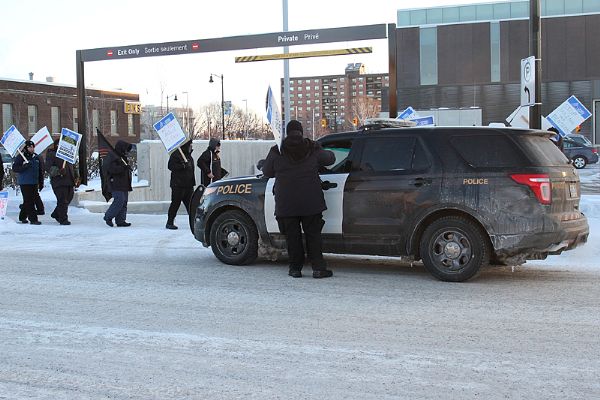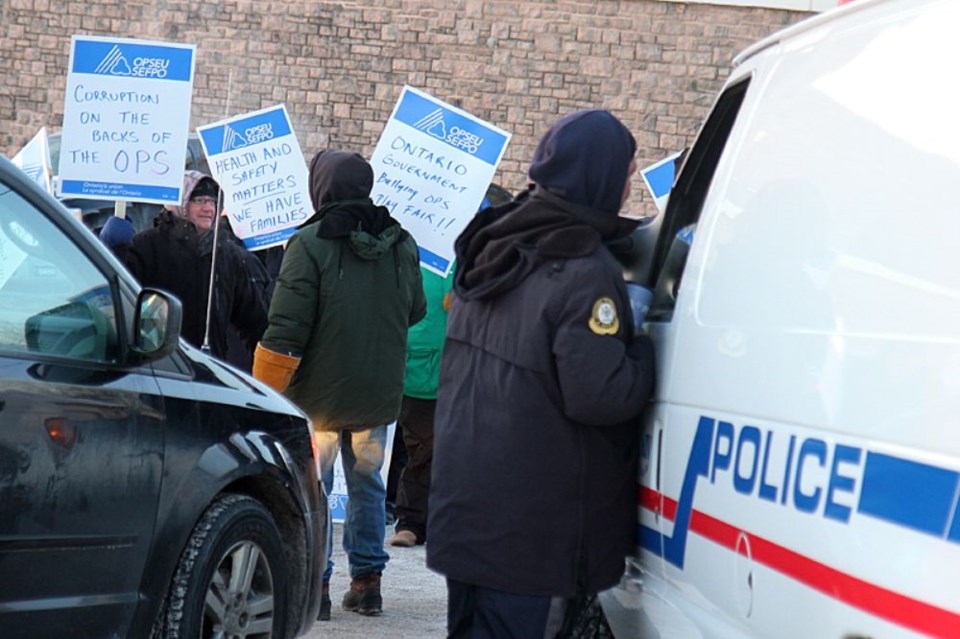THUNDER BAY -- A correctional workers strike could have a significant impact on the court system.
That’s the message local members were spreading on Monday as demonstrations were held in the morning outside the Thunder Bay District Jail and at the Thunder Bay Courthouse, impeding the ability of law enforcement agencies to pick up and drop off prisoners for court appearances.
Shawn Bradshaw, president of OPSEU Local 708 which represents workers at the Thunder Bay Correctional Centre on Highway 61, said any kind of labour dispute could have significant impacts.
“This is exactly what could happen. Court could be slowed up and the whole judicial process would grind to a halt if we go on strike,” Bradshaw said outside the courthouse, where an OPP transport vehicle was waiting to get inside.
“They need to think about who’s watching the criminals in jail and who’s going to be watching the ones on community sentences and conditions because if we’re out on strike probation and parole won’t be watching them. Police don’t have time to watch them so they’re just going to be out without any real monitoring.”
Correctional workers are just one segment of the Ontario Public Service Employees Union, which represents about 115,000 members who are now working without a contract after the previous one expired on Dec. 31.
Similar rallies were held across the province to show support with the union as the first round of negotiations in 2015 began.
Strike mandate votes were held in December, with workers across the public service showing support in favour of job action if negotiations do not proceed smoothly.

“If they come back with another offer like they did the first day of negotiations, which is all takeaways and complete concession bargaining, we’ll be on strike sooner rather than later,” Bradshaw said.
“We’d like to see this come to a fair agreement. Nobody wants to be on strike. We’re hoping this can spur them to action.”
With so many different types of workers impacted the bargaining process is not simple. Major financial pieces, such as salaries and benefits, are negotiated centrally between OPSEU and the provincial government while industry specific elements are dealt with afterwards.
One of the biggest demands for corrections is to be treated the same as other law enforcement agencies.
“We want to be treated as a true essential service and first responder group. We want our wages to be more in comparison to some of the other law enforcement agencies and first responders.” said OPSEU Local 737 president Michael Lundy.
“Before the paramedics, firefighters and police get here we’re doing it all. We do (first aid), combat small fires and do all the law enforcement inside.”
He added that if they can stand outside during extreme cold the government shouldn’t expect them to quickly back down.
“The message to (Premier Kathleen) Wynne and the Liberal government is that it’s -50 C and if they’re testing our resolve, you can see clearly there are 30 members here and another 30 at the courthouse,” Lundy said.
“We’re ready to go if we have to.”
